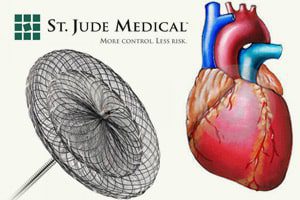
The safety warning has been issued on St. Jude Medical’s Amplatzer ASO, a cardiac medical device used to close atrial septal defects. The heart device can cause cardiac tissue erosion. To date, the U.S. Food and Drug Administration (FDA) has received more than 100 reports of erosion tied to the Amplatzer ASO from 2002 to […]
 The safety warning has been issued on St. Jude Medical’s Amplatzer ASO, a cardiac medical device used to close atrial septal defects. The heart device can cause cardiac tissue erosion.
The safety warning has been issued on St. Jude Medical’s Amplatzer ASO, a cardiac medical device used to close atrial septal defects. The heart device can cause cardiac tissue erosion.
To date, the U.S. Food and Drug Administration (FDA) has received more than 100 reports of erosion tied to the Amplatzer ASO from 2002 to 2011, according to MassDevice.com. During that same period, a number of medical journals published articles describing tissue erosion reported in patients implanted with the Amplatzer ASO. While rare, the injury may be life threatening, according to federal regulators. The FDA has asked the device maker to conduct new studies following patient implantation with the Amplatzer ASO at one, six, and 12 months.
Published estimates reveal that these types of serious adverse events occur in about 1-to-3 of every 1,000 patients implanted with the Amplatzer ASO. As of March 31, 2013, a total of 234,103 Amplatzer ASOs have been implanted worldwide.
The update followed a public advisory committee meeting that took place more than one year ago in which FDA regulators met to review and discuss the potential dangers of septal defect closure devices, St. Jude spokeswoman Kristi Warner told MassDevice.com. “We respect the role of the FDA and share their goal of protecting patient safety,” Warner said.
When the Amplatzer ASO rubs against the heart wall, tissue erosion can occur, can create a hole, and can lead to additional scraping or erosion through tissue in the upper chambers of the heart. The damage typically takes place in the top of the atria, close to the aorta. The scraping may also cause separate or simultaneous holes in the heart’s aortic root, which could cause blood to build in the cardiac tamponade, which is the sac that surrounds the heart. Should this damage occur, the heart may not work properly; the patient may need to undergo immediate open-heart surgery. During surgery, the Amplatzer ASO will be removed, any holes in the heart will be closed, any other heart defects caused by the erosion will be corrected, and the original defect will be repaired.
Tissue erosion can also lead to fistulas, an abnormal scar tissue that connects previously unconnected parts of the heart. Although not considered life threatening, according to the FDA, cardiac fistulas require surgery and, when left untreated, can lead to congestive heart failure.
According to the agency, “The FDA has not yet identified risk factors related to the occurrence of erosion…. This type of device failure has not been seen in similar devices used to treat this condition.”
The St. Jude’s Amplatzer line was released about one year ago; however, clinical trials did not significantly reduce cryptogenic stroke when compared with standard treatment with drugs in individuals who are treated for a specific heart defect.
The cardiac implant device is used to treat a type of abnormal cardiac hole in children and adults. The ASD occurs between the heart’s upper-left and –right chambers—known as the atria. The Amplatzer ASO is a metal device implanted by catheter into a vein. The procedure is considered a minimally invasive ASD closure method and is often used as an alternative to the more invasive open-heart surgery.


